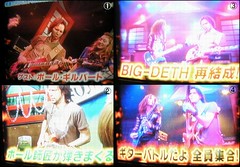
Next week ...
Originally uploaded by nofrills.
The "Next Week on Rock Fujiyama ..." part from the ending. I took and uploaded these pictures to show our "daily" language.
Picture 1:
The katakana phrase, ゲスト:ポール・ギルバート, reads [ge-su-to: po-o-ru gi-ru-ba-a-to], and means "Guest: Paul Gilbert". Simple.
Picture 2:
The phrase ポール師匠が弾きまくる is a bit slangish. It's "The Great Master Paul has a go on his guitar" or something.
師匠 is a very formal word meaning "guru, mentor, great master" and Mr Gilbert must be a guitar genius (I don't know much about him), but as a slang, we use this word to be funny and to be somewhat formal at the same time. I think in this case, they are showing respect in a friendly and funny way.
~まくる (to be precise, it's ~しまくる) is not formal at all, and I don't know how I can put it in English. Consult a dictionary.
Picture 3:
"BIG-DETH 再結成" is "Big-Deth Reunion!" with the Big-Deth here being Paul Gilbert from the Big something (I really don't remember, what was it?) and Marty Friedman from the Megadeth.
再結成 is 再+結成, just like reunion is re+union, and means the same.
Picture 4:
To explain "ギターバトルだよ 全員集合! (Guitar Battle, Everyone!)", I have to mention some pop-culture history.
In the 1970s and 1980s, almost all the children watched a TV comedy/variety show called "8時だよ 全員集合! (It's Eight O'Clock! Come On Everybody)" on Saturday night. The show was hosted by the Drifters, the famous Japanese comedy team of five, led by いかりや長介 (Chosuke Ikaruya), who sadly died three years ago. It was a comedy show, a bit like Monty Python for the kids and Saturday Night Live blended together and made Japanese. They had a 15-minute comedy sketch, had various guests like pop stars and singers, and everything in the show was funny, comical and crazy - not so crazy as the Monty Python, though.
For all the craziness, it was the most popular TV programme among the children (including me) and the biggest annoyance for the parents. (I know my parents were amused to watch the show, though they would say "This programme is bad"!)
So, the name of the show has been remembered even long after the show itself is gone. It's part of our culture. Thus, there are a lot of use of the phrase "~だよ 全員集合" in our pop-culture. In other words, this is a "common language" among people who are now in their thirties and early forties. Sometimes we still use Mr Ikariya's trademark phrase おい~っす (meaning "hello"), unconsciously, between close friends and no one thinks it strange. It's so natural, a part of our generation.
Clever people know this too. Recently, the Kirin Beer used the "image" of the show in their 淡麗グリーン (Tanrei Green) advert. The music in the advert is from the 全員集合 show, and the five guys remind people of the Drifters - the tall boss, quiet one, fat one, funny one and silly one, with the "silly" doing あいーん, which is a trademark soundbite of the comedian 志村けん (Shimura Ken), the youngest of the Drifters.
The Drifters were originally a music band, as the name tells. They supported the Beatles when they came to Japan in 1966. They were a "comic band", though I was born too late to see them play music. Later they became a team of comedians, and one of them, 荒井注, quit in the 1970s (?), being replaced by Shimura.
And now, 志村けん is one of the most famous comedians in Japan. Another ex-Drifters member 加藤茶 (Kato Cha, meaning Kato the Tea: the funny) is also a top comedian. Other members, 仲本工事 (Nakamoto Koji, meaning Nakamoto the Construction/Repairs: the quiet) and 高木ブー (Takagi Boo: the fatty), seem to be retired from our comedy scene. Takagi Boo is a famous Hawaiian music player and has his own Hawaiian restaurant in Tokyo.
The late leader いかりや長介 (Chosuke Ikaruya) turned a serious actor in his later life, appearing in a lot of TV dramas and feature films. Just two or three years before his death, he appeard in a Kirin beer advert, playing the bass - it was my first time to see him as a musician.
By the way, later in my life I was interested in classic comedy films - Buster Keaton, Charlie Chaplin, Laurel and Hardy and so on, and found how the Drifters had been influenced by these great comedians. Their most remarkable influence was, I think, the Marx Brothers. When I saw the famous "mirror" scene in the Duck Soup, it was like "Ah, THAT was THIS!"
ROCK FUJIYAMA:
www.tv-tokyo.co.jp/fujiyama/
About this show (my description):
flickr.com/photos/nofrills/399643975/